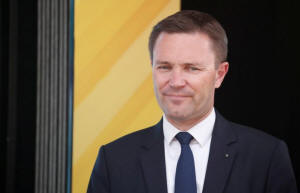|
Cycling teams representative says UCI taking them for granted
 Send a link to a friend
Send a link to a friend
 [September 21, 2018]
By Martyn Herman [September 21, 2018]
By Martyn Herman
LONDON (Reuters) - Cycling teams are
being "taken for granted" by world governing body the UCI and fear
that planned reforms will continue to leave them short-changed,
according to a representative of cycling's team organization, the
AIGCP.
Team bosses, race organizers and other stakeholders held a meeting
in Madrid earlier this month in which they outlined their concerns
ahead of reforms proposed by UCI president David Lappartient to be
implemented by 2020.
Top of the agenda was the UCI's push to reduce the WorldTour from 18
to 15 teams with promotion and relegation, something the
International Association of Professional Cycling Teams (AIGCP) is
fighting to prevent.
AIGCP vice-president Richard Plugge said the Madrid talks with
Lappartient had been held in a "good atmosphere".
Yet having since been briefed on the UCI's proposals he was
pessimistic, saying that their economic concerns were not being
heard.

"We asked that we keep the minimum bar, what we already have, 18
teams and three-year licenses. It's not a win but we want to keep
that," Plugge, director of Team LottoNL-Jumbo, told Reuters in a
phone interview.
"Yesterday we were briefed on the plan and the minimum bar was there
but no progression at all in the (economic) reform."
Plugge says cycling has become the poor relation of other sports
such as tennis, golf, soccer and Formula One and that the economic
model has barely changed for 50 years.
He says the teams, whose only source of revenue is what they receive
from sponsors, are "bankrolling" the UCI and have effectively had
their negotiating rights taken away.
The AIGCP wants to bundle rights together with organizers to create
new revenue streams for the teams.
"We were the first sport professional to have money coming from
sponsors, 50 years ago," he said. "From that moment on the economic
model stood still.
"(David) has said he wants to improve the economic model but at this
point the plans he showed us are not in that direction.
[to top of second column] |

UCI President David Lappartient attends the podium ceremony.
REUTERS/Benoit Tessier

"If that is really what he wants then he should get the organizers
and the teams in one room and let them make a good business plan and
economic model for cycling."
The UCI Management Committee will discuss the reforms at this
month's Road World Championships in Innsbruck.
Should they not meet with approval some teams are understood to be
considering by-passing the UCI altogether and negotiating directly
with race organizers.
AIGCP president Iwan Spekenbrink, CEO of German team Sunweb, says
revamping the economics of cycling is a "no-brainer".
"Economic rights are being taken from the teams and their riders so
the model is already not good," he said on Thursday.
"Only half of the teams at the start of the WorldTour have survived.
We keep working on this flawed system which is fragmented instead of
working in partnerships.
"Everyone has known for 20 years that this model kept in place by
the UCI is the wrong model for the sport. It's a no brainer. The
moment you allow organizers and teams to bundle the rights and
create a complete product and sell it you will generate much more
money for all stakeholders."
Spekenbrink also said reducing the WorldTour to 15 teams could put
some his members out of business.
"All the teams are looking for more stability," he said.
"(The teams) are happy to work in a competitive environment to win
bike races but not happy to be in a competitive environment for
survival."
(Reporting by Martyn Herman; Edting by Toby Davis)
[© 2018 Thomson Reuters. All rights
reserved.] Copyright 2018 Reuters. All rights reserved. This material may not be published,
broadcast, rewritten or redistributed.
Thompson Reuters is solely responsible for this content.
 |